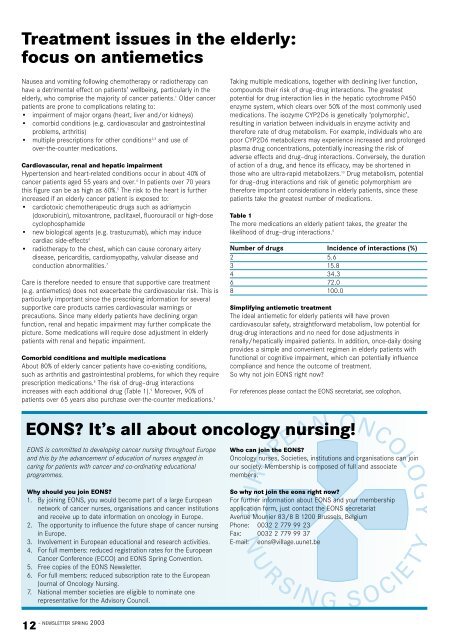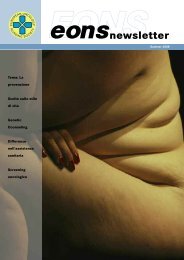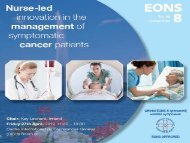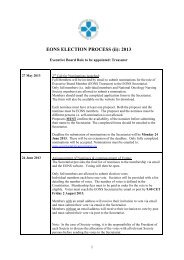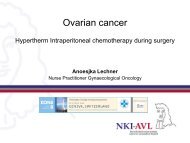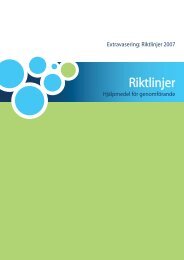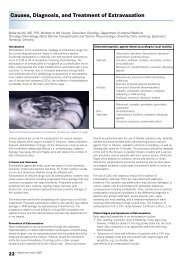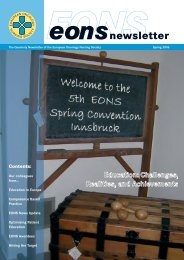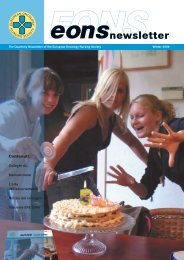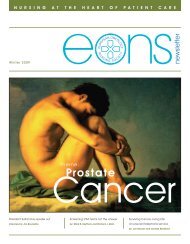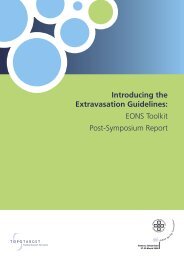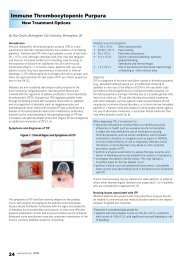Treatment issues in <strong>the</strong> elderly:focus on antiemeticsNausea and vomiting following chemo<strong>the</strong>rapy or radio<strong>the</strong>rapy canhave a detrimental effect on patients’ wellbeing, particularly in <strong>the</strong>elderly, who comprise <strong>the</strong> majority of cancer patients. 1 Older cancerpatients are prone to complications relating to:• impairment of major organs (heart, liver and/or kidneys)• comorbid conditions (e.g. cardiovascular and gastrointestinalproblems, arthritis)• multiple prescriptions for o<strong>the</strong>r conditions 2,3 and use ofover-<strong>the</strong>-counter medications.Cardiovascular, renal and hepatic impairmentHypertension and heart-related conditions occur in about 40% ofcancer patients aged 55 years and over. 4 In patients over 70 yearsthis figure can be as high as 60%. 5 The risk to <strong>the</strong> heart is fur<strong>the</strong>rincreased if an elderly cancer patient is exposed to:• cardiotoxic chemo<strong>the</strong>rapeutic drugs such as adriamycin(doxorubicin), mitoxantrone, paclitaxel, fluorouracil or high-dosecyclophosphamide• new biological agents (e.g. trastuzumab), which may inducecardiac side-effects 6• radio<strong>the</strong>rapy to <strong>the</strong> chest, which can cause coronary arterydisease, pericarditis, cardiomyopathy, valvular disease andconduction abnormalities. 7Care is <strong>the</strong>refore needed to ensure that supportive care treatment(e.g. antiemetics) does not exacerbate <strong>the</strong> cardiovascular risk. This isparticularly important since <strong>the</strong> prescribing information for severalsupportive care products carries cardiovascular warnings orprecautions. Since many elderly patients have declining organfunction, renal and hepatic impairment may fur<strong>the</strong>r complicate <strong>the</strong>picture. Some medications will require dose adjustment in elderlypatients with renal and hepatic impairment.Comorbid conditions and multiple medicationsAbout 80% of elderly cancer patients have co-existing conditions,such as arthritis and gastrointestinal problems, for which <strong>the</strong>y requireprescription medications. 8 The risk of drug–drug interactionsincreases with each additional drug (Table 1). 9 Moreover, 90% ofpatients over 65 years also purchase over-<strong>the</strong>-counter medications. 3Taking multiple medications, toge<strong>the</strong>r with declining liver function,compounds <strong>the</strong>ir risk of drug–drug interactions. The greatestpotential for drug interaction lies in <strong>the</strong> hepatic cytochrome P450enzyme system, which clears over 50% of <strong>the</strong> most commonly usedmedications. The isozyme CYP2D6 is genetically ‘polymorphic’,resulting in variation between individuals in enzyme activity and<strong>the</strong>refore rate of drug metabolism. For example, individuals who arepoor CYP2D6 metabolizers may experience increased and prolongedplasma drug concentrations, potentially increasing <strong>the</strong> risk ofadverse effects and drug–drug interactions. Conversely, <strong>the</strong> durationof action of a drug, and hence its efficacy, may be shortened inthose who are ultra-rapid metabolizers. 10 Drug metabolism, potentialfor drug–drug interactions and risk of genetic polymorphism are<strong>the</strong>refore important considerations in elderly patients, since <strong>the</strong>sepatients take <strong>the</strong> greatest number of medications.Table 1The more medications an elderly patient takes, <strong>the</strong> greater <strong>the</strong>likelihood of drug–drug interactions. 9Number of drugs Incidence of interactions (%)2 5.63 15.84 34.36 72.08 100.0Simplifying antiemetic treatmentThe ideal antiemetic for elderly patients will have provencardiovascular safety, straightforward metabolism, low potential fordrug-drug interactions and no need for dose adjustments inrenally/hepatically impaired patients. In addition, once-daily dosingprovides a simple and convenient regimen in elderly patients withfunctional or cognitive impairment, which can potentially influencecompliance and hence <strong>the</strong> outcome of treatment.So why not join EONS right now?For references please contact <strong>the</strong> EONS secretariat, see colophon.EONS? It’s all about oncology nursing!EONS is committed to developing cancer nursing throughout <strong>European</strong>d this by <strong>the</strong> advancement of education of nurses engaged incaring for patients with cancer and co-ordinating educationalprogrammes.Who can join <strong>the</strong> EONS?<strong>Oncology</strong> nurses, Societies, institutions and organisations can joinour society. Membership is composed of full and associatemembers.Why should you join EONS?1. By joining EONS, you would become part of a large <strong>European</strong>network of cancer nurses, organisations and cancer institutionsand receive up to date information on oncology in Europe.2. The opportunity to influence <strong>the</strong> future shape of cancer nursingin Europe.3. Involvement in <strong>European</strong> educational and research activities.4. For full members: reduced registration rates for <strong>the</strong> <strong>European</strong>Cancer Conference (<strong>ECCO</strong>) and EONS Spring Convention.5. Free copies of <strong>the</strong> EONS Newsletter.6. For full members: reduced subscription rate to <strong>the</strong> <strong>European</strong>Journal of <strong>Oncology</strong> <strong>Nursing</strong>.7. National member societies are eligible to nominate onerepresentative for <strong>the</strong> Advisory Council.So why not join <strong>the</strong> eons right now?For fur<strong>the</strong>r information about EONS and your membershipapplication form, just contact <strong>the</strong> EONS secretariatAvenue Mounier 83/8 B 1200 Brussels, BelgiumPhone: 0032 2 779 99 23Fax: 0032 2 779 99 37E-mail: eons@village.uunet.be- NEWSLETTER SPRING 200312
The <strong>European</strong> <strong>Oncology</strong> <strong>Nursing</strong> <strong>Society</strong>The <strong>European</strong> <strong>Oncology</strong> <strong>Nursing</strong> <strong>Society</strong> which was established in 1984 is comprised of individual cancer nurses, national oncology nursingsocieties and institutions and agencies in Europe involved in cancer care. EONS has a membership of over 50 organisations, which in turnrepresent approximately 15000 nurses in 25 <strong>European</strong> countries.Educational, consultative and research activities of EONS are aimedtoward promoting and improving <strong>the</strong> quality of care received by cancerpatients throughout Europe. The development and dissemination of aCore Curriculum for a Post-Basic Course in Cancer <strong>Nursing</strong>, recentlyrevised through support from <strong>the</strong> EU Europe against CancerProgramme, has been instrumental in improving cancer care throughspecialised nursing education. EONS collaborates on numerousinitiatives with multidisciplinary health care professionals. Workingrelationships have been established with <strong>the</strong> International <strong>Society</strong> forNurses in Cancer Care (ISNCC) <strong>the</strong> <strong>Oncology</strong> <strong>Nursing</strong> <strong>Society</strong> (ONS)various <strong>European</strong> nursing organisations and speciality groups, <strong>the</strong>World Health Organisation Regional Office for Europe, <strong>the</strong> AdvisoryCommittee on Training in <strong>Nursing</strong> (ACTN) and <strong>the</strong> Standing Committeeof <strong>Nursing</strong> of <strong>the</strong> EU (PCN). EONS is a full member of <strong>the</strong> Federationof <strong>European</strong> Cancer Societies (FECS). The working language of <strong>the</strong><strong>Society</strong> is English although every effort is made to provide translationof educational materials into <strong>the</strong> working languages of Europe and toprovide translation services at educational events.The organisational structure of EONSAn Executive Board, Advisory Council and <strong>the</strong> General Membershipmake up <strong>the</strong> organisational structure of EONS. These three bodiescollaborate to identify <strong>the</strong> goals and strategies of <strong>the</strong> <strong>Society</strong> and toimplement activities that support <strong>the</strong> mission of EONS.A General Meeting is held annually at ei<strong>the</strong>r <strong>the</strong> Spring Conventionor <strong>the</strong> <strong>ECCO</strong> meeting. All members as well as observers are invitedto attend. The next General Meeting will take place in conjunctionwith <strong>ECCO</strong> 12 to be held in <strong>Copenhagen</strong> in October 2003.The Membership governs <strong>the</strong> <strong>Society</strong> through activities includingvoting on constitutional changes, discussion of strategic issues andnomination and election of members of <strong>the</strong> Executive Board. AnAdvisory Council meets once per year with <strong>the</strong> Executive Board toadvise on policy and <strong>the</strong> strategic development of <strong>the</strong> <strong>Society</strong>. Thiscouncil is composed of representatives of national oncology nursingsocieties (in Europe) who are full members of EONS. The previousAdvisory Council meeting took place in March 2003 at <strong>the</strong> EONSHeadquarters in Brussels. The Executive Board acts in <strong>the</strong> capacityof Trustees and conducts <strong>the</strong> affairs of <strong>the</strong> <strong>European</strong> <strong>Oncology</strong><strong>Society</strong> (EONS) in accordance with <strong>the</strong> policies determined by <strong>the</strong>Members and <strong>the</strong> Advisory Council.Publications<strong>European</strong> Journal of <strong>Oncology</strong> <strong>Nursing</strong>The official publication of EONS is <strong>the</strong> <strong>European</strong> Journal of<strong>Oncology</strong> <strong>Nursing</strong> and seeks to address issues of importance tooncology nurses throughout Europe. The journal is published 4times a year and is a forum that provides information oncontemporary practice issues and <strong>the</strong> latest cancer research.Topics of importance in cancer care are addressed through <strong>the</strong>exchange of knowledge and experience. In an effort to addresslanguage differences and difficulties among <strong>European</strong> cancernurses, abstracts of articles appearing in EJON are published inEnglish, German and Spanish. The major articles are written inEnglish. EJON is listed in <strong>the</strong> Cumulative Index to <strong>Nursing</strong> &Allied Health Literature print index and <strong>the</strong> CINAHL database.EONS NewsletterThe EONS Newsletter is a publication that is distributed to <strong>the</strong>membership on a quarterly basis. The goal of <strong>the</strong> EONSnewsletter is to inform nurses about EONS and EONS activitiesand to inspire nurses throughout Europe to improve <strong>the</strong> care of<strong>the</strong> cancer patient. Fur<strong>the</strong>r information on membership in EONScan be obtained by contacting <strong>the</strong> EONS Secretariat:EONS SecretariatMr. Rudi BrikéAvenue E. Mounier 83, B-1200 BrusselsPhone: +32 2 779 99 23, Fax: +32 2 779 99 37E-mail: eons@village.uunet.bewww.cancereurope.org/EONS.htmlMASCC SummaryStudy highlights need for clarification on anaemiamanagement in cancerA pilot survey conducted during <strong>the</strong> MASCC congress, held in June2003, suggests oncology nurses’ may need access to moreinformation about anaemia in cancer since key findings revealconfounding views. Over 50 nurses from 25 countries participated in<strong>the</strong> survey.The survey revealed that 95% of oncology nurses that participatedwere aware that fatigue is a major problem for cancer patients andthat anaemia should be treated. In addition, most respondents (88%)said <strong>the</strong>y felt epoetin, in some form, is <strong>the</strong> most effective treatmentfor cancer-associated with anaemia. However, only 10% of thosesurveyed felt anaemia should be treated early, at cancer diagnosis. As<strong>the</strong> awareness of anaemia is high, this is surprising and it is temptingto ask ‘If patients received treatment for anaemia early on in <strong>the</strong>course of <strong>the</strong>ir cancer, would this be of added benefit?’Benefits of early treatment of anaemia are undisputed and supportedby clinical research. <strong>Oncology</strong> nurses have a key role to play in <strong>the</strong>management of patients with cancer at all stages of <strong>the</strong>ir condition.This small pilot survey suggests that awareness initiatives are neededto increase <strong>the</strong> management of patients’ anaemia as early as possible.This study was supported by an unrestricted educationalgrant from Roche.1. MASCC 15th International Symposium: Supportive Care in Cancer,18th-21st June 2003, Berlin Germany. Anaemia management in cancerpatients-A nurse’s survey-Roche Pharmaceuticals.NEWSLETTER SPRING 2003 -13


